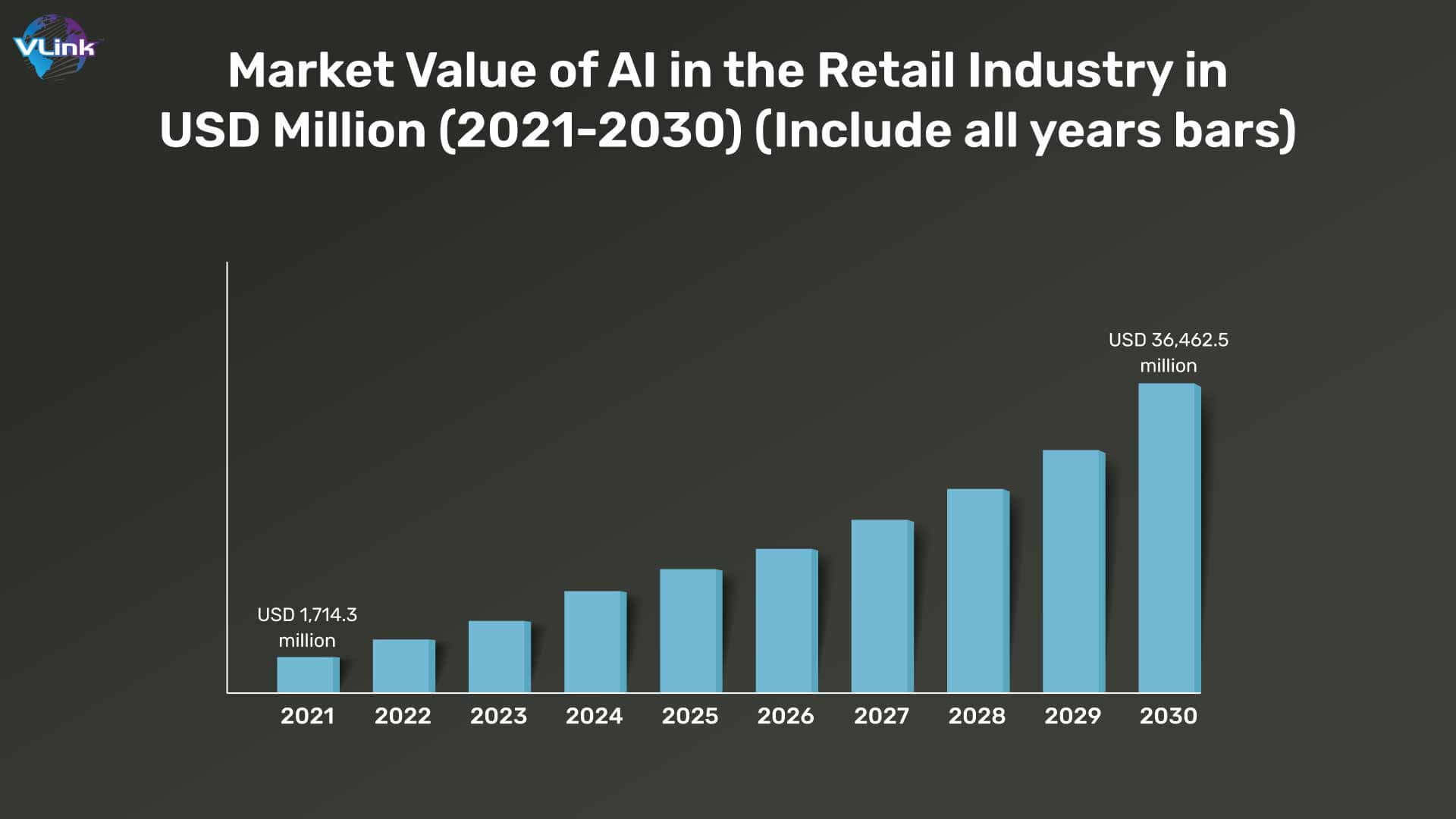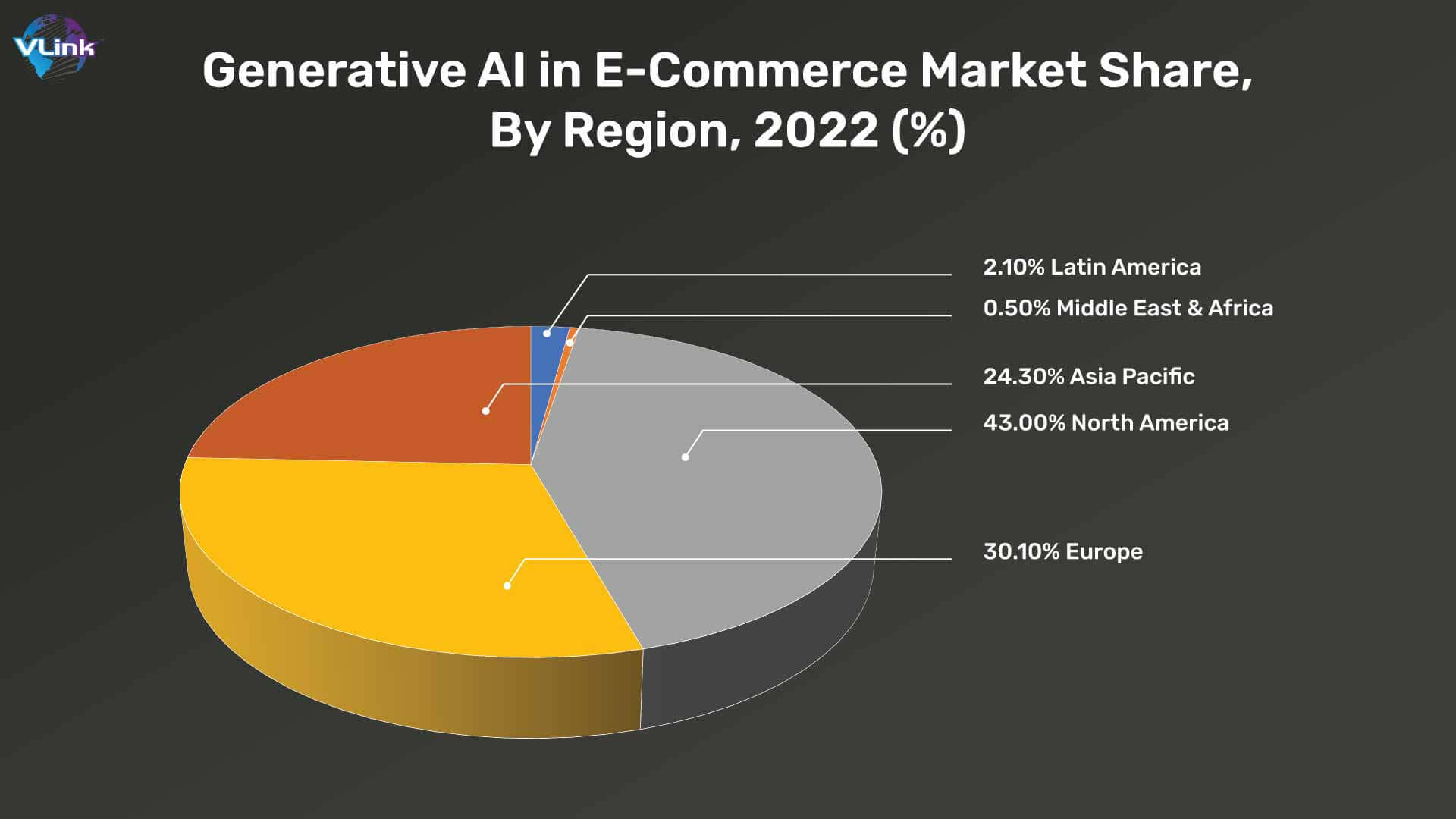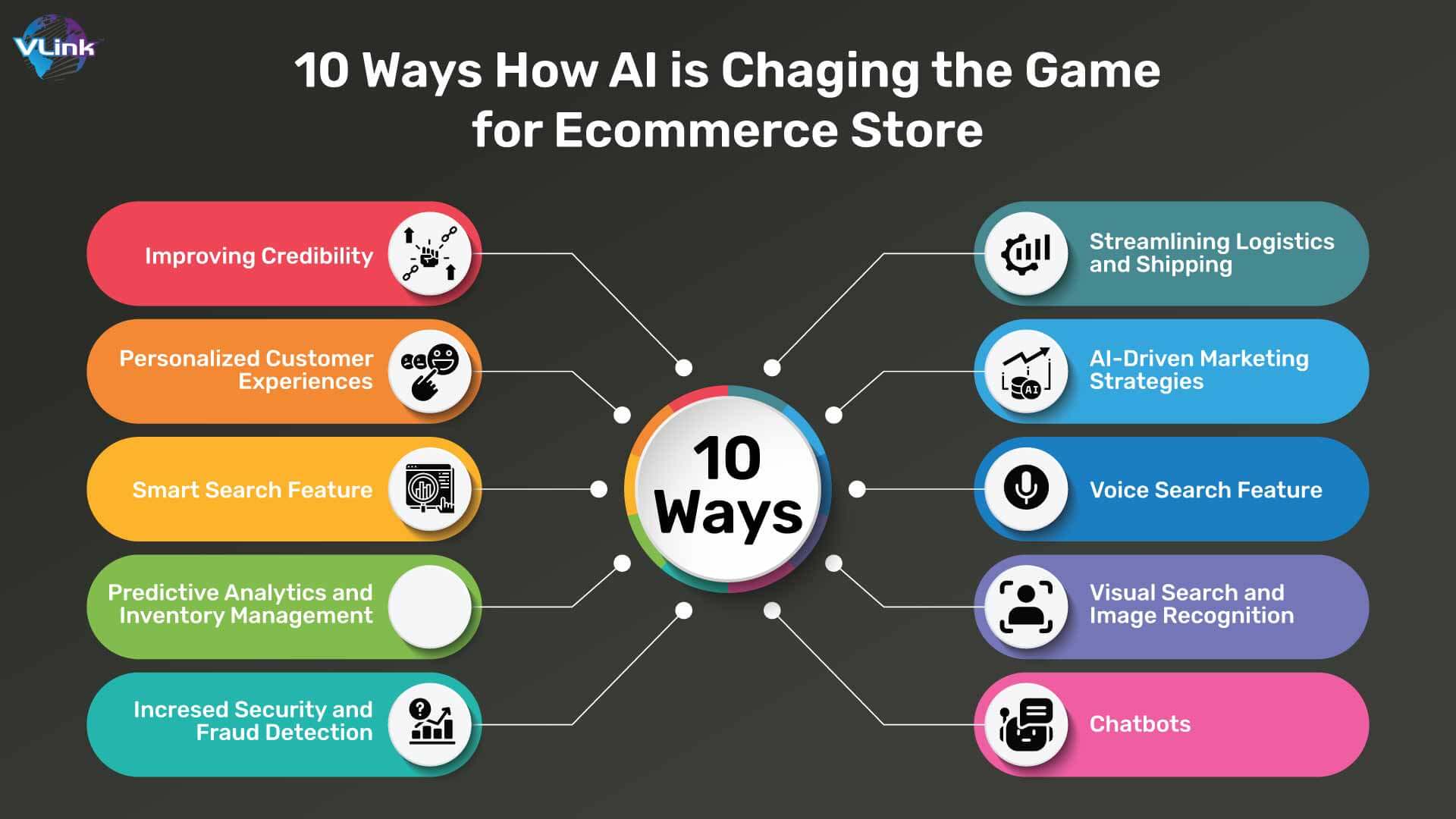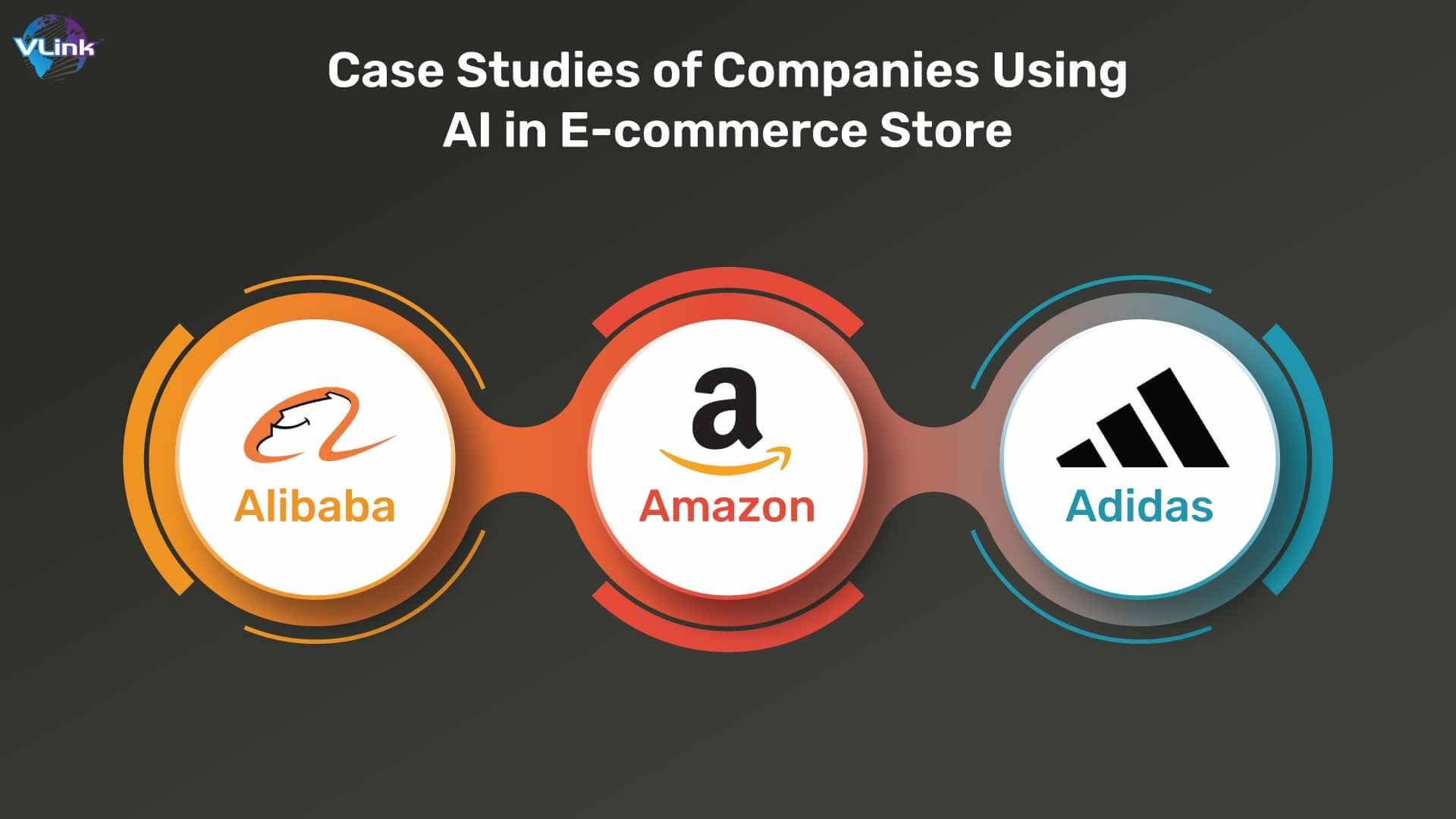In the ever-evolving retail landscape where change is the only constant, the influence of artificial intelligence (AI) emerges as a formidable force poised for significant growth. From e-commerce giants like Amazon to smaller, specialized stores, AI is playing a transformative role in reshaping the dynamics of the online retail game.
The anticipated value of artificial intelligence in the retail industry is projected to surge from approximately USD 1,714.3 million in 2021 to a staggering USD 36,462.5 million by the year 2030, coinciding with the expected expansion of e-commerce sales by USD 7.3 trillion by 2025.

According to findings by Accenture, the implementation of AI can elevate retail revenues by up to 38% by the year 2035.
North America holds the first position in the online retailing business with 40% of the market share, as shown below figure:

With a spectrum of capabilities ranging from personalized recommendations to efficient inventory optimization, AI-powered solutions are actively contributing to shaping the future of online shopping.
Let's delve into the various ways in which AI is revolutionizing the e-commerce sector.
10 Ways How AI is Changing the Game for E-commerce Store

Customer support plays a crucial role in the success of eCommerce businesses. AI is an asset in this context, elevating the customer experience by providing pertinent information and understanding individual preferences.
Additionally, it promotes transparency and fairness through dynamic pricing strategies, minimizing the chances of misrepresentations.
Incorporating artificial intelligence enhances the quality, guidance, and information provided, ultimately boosting the overall efficiency of communication between the organization and customers. This, in turn, fosters stronger relationships.
An impactful utilization of AI in eCommerce industry involves creating personalized experiences tailored to the unique preferences of individual customers. AI tools analyze historical purchase patterns and browsing activities to construct comprehensive customer profiles.
These profiles empower online stores to offer personalized product suggestions, precise promotions, and curated content, ensuring sustained customer engagement.
A practical example is the implementation of AI algorithms by the platform AI Hub, which examines customer data to craft individualized landing pages for each visitor. This approach has resulted in e-commerce businesses experiencing an increase of up to 15% in revenue, thanks to the delivery of pertinent product recommendations.
Through data-driven personalization, AI technology eliminates the uncertainty in understanding customer preferences.
Artificial intelligence plays a crucial role in enhancing on-site search functionality. Traditional keyword-centric searches often struggle to grasp user intent, whereas AI-powered search tools leverage natural language processing (NLP) to comprehend the context behind queries.
Unlike conventional keyword matching, these semantic search capabilities generate results based on underlying meanings and concepts. E-commerce websites employing AI-driven search can adeptly handle intricate voice or text queries, enhancing search relevance.
For instance, when a user searches for "festive gifts for grandparents," the search engine interprets the context and provides relevant gift recommendations.
According to a report from Inc., incorporating AI-powered search leads to an increase of over 10% conversion rate. Given that search remains a primary method for development discovery online, integrating intelligent search functionality is pivotal for the success of online stores.
E-commerce retailers face a significant challenge in synchronizing inventory with fluctuations in customer demand. Maintaining excess inventory ties up working capital, while understocking results in missed revenue opportunities.
AI predictive & data analytics services address this challenge by offering data-driven demand forecasting, optimizing inventory planning, and preventing stockouts.
AI systems accurately predict product demand by analyzing historical sales data, market trends, pricing, promotions, weather, and other factors. It enables retailers to plan inventory replenishment and enhance overall profitability strategically. Intelligent inventory optimization ensures smooth operations and elevates the customer experience.
Colder Ice Cream, for instance, achieved a fivefold increase in forecast accuracy by implementing AI-based inventory planning, effectively eliminating examples of out-of-stock situations. In the face of supply chain challenges impacting retailers, leveraging AI's predictive capabilities for inventory management has become indispensable.
Safeguarding online businesses is another way how AI and ML is revolutionize the future of digital transformation. The realm of e-commerce is under significant threat from organized retail crime, identity fraud, and online scams, with projected global fraud-related losses reaching USD 30 billion by 2023.
AI's anomaly detection models excel at identifying suspicious patterns and potential threats that might elude human detection. AI systems can promptly flag fraudulent activities in real-time by analyzing transaction data, customer behavior, device patterns, and other signals. It empowers online retailers to halt fraudulent transactions and minimize chargebacks.
With the ability to process vast quantities of transactions, AI is a scalable augmentation to cybersecurity and fraud prevention. Leading retailers like Walmart have already witnessed a 20–30% improvement in fraud detection by implementing AI.
As cyber-attacks become increasingly sophisticated, AI is an essential guardian against fraud.
AI plays a pivotal role in enhancing the efficiency of logistical and delivery operations for online stores by intelligently orchestrating warehouse activities and optimizing shipping routes.
Utilizing computer vision, warehouse robots adeptly handle inventory management. Machine learning algorithms analyze traffic patterns and weather data to discern the most efficient delivery routes and sequences.
FedEx, for instance, leverages AI to streamline scheduling and routing for its delivery trucks, resulting in significant annual savings in fuel costs amounting to millions of dollars.
With the continuous growth of e-commerce, implementing AI-optimized logistics becomes imperative for effectively managing the surge in order volumes.
Leveraging data insights from AI algorithms offers a competitive advantage in formulating marketing campaigns. AI scrutinizes audience segments and pinpoints the most promising potential customers to target.
Real-time assessment of factors such as customer lifetime value, buying signals, and responsiveness to promotions enables the optimization of ad campaigns. An example is the AI system employed by Stitch Fix, which devised an advertising strategy resulting in a 40% lower cost per acquisition.
AI influences various strategic marketing decisions, from budget allocation to cross-channel optimization. Automated audience segmentation, predictive analytics, and swift experimentation, all powered by AI, are reshaping the marketing landscape.
The emergence of voice-based interfaces is a significant trend driven by AI, revolutionizing the e-commerce landscape. Devices like Amazon Alexa or Google Home, activated by voice commands, are at the forefront of this transformation.
AI enables speech recognition and natural language capabilities, empowering consumers to search and make purchases through voice commands. Voice search eliminates barriers, offering an intuitive and hands-free shopping experience.
Forward-thinking retailers are strategically adapting to this trend by optimizing for voice search and establishing dedicated channels for voice-powered shopping, all facilitated by AI.
This AI-powered technology diverges from traditional keyword searches, allowing for intuitive discovery based on styles, patterns, aesthetics, and unique product attributes. The implementation of visual search not only enriches the user experience but also boosts conversion rates.
A notable example is eCommerce giant eBay, which witnessed an increase of over 10% in customer satisfaction scores and sales conversion rates with the AI-powered visual search tool eBay Find It On eBay.
Visual search is transformative in categories like fashion or home decor, aligning products more precisely with individual tastes and preferences.
As per Grand View Research, the chatbot market is projected to reach USD 3.99 billion by 2030. Using AI chatbots in eCommerce is instrumental in optimizing operational efficiency, boosting sales, and providing an unmatched customer experience.
These AI-enabled chatbots for customer management offer round-the-clock support and multilingual options, minimize human errors, and assist in tracking orders and updates.
Whether they are stateless or stateful chatbots, a notable advantage is their ability to choose the most appropriate and relatable language for the target audience.
Case Studies of Companies Using AI in E-commerce Store

The Chinese e-commerce giant Alibaba has integrated various AI-powered functionalities, encompassing personalized product recommendations, tailored search results, and individualized web pages.
This strategic implementation has led to a notable surge in user engagement and sales, with customized product recommendations contributing to 75% of all product clicks on the platform.
By examining customer data and product details, Amazon's AI algorithms adeptly produce personalized product recommendations and refine search outcomes. This strategic use of AI has propelled the company to enhance sales and elevate customer satisfaction, with customized recommendations contributing to as much as 35% of Amazon's total sales.
Using 3D models has significantly improved Adidas' Virtual Try-On feature, enabling customers to virtually test out shoes before purchasing. Additionally, Adidas leverages these 3D models to automatically generate 2D virtual product photos and videos, eliminating the necessity for conventional product photography.
How Can your eCommerce Business Adapt to the Latest AI Trends?
Defining your eCommerce business's objectives is the initial and pivotal step in identifying pertinent AI trends. These objectives vary across companies, encompassing goals such as refining marketing strategies, automating processes, establishing brand awareness, and more.
Examine your eCommerce operations thoroughly to uncover significant pain points, from financial difficulties to operational inefficiencies. By scrutinizing extensive data and recognizing patterns, businesses can gain insights for implementing targeted solutions to address these challenges.
Assessing your existing technological infrastructure and capabilities can reveal gaps where the integration of machine learning and AI development solutions in eCommerce may be introduced to drive potential enhancements.
AI-powered tools aid eCommerce enterprises in identifying sales trends and generating precise forecasts related to customer behavior and product demand. Additionally, these tools enhance targeting strategies, enabling companies to formulate a comprehensive budget and resource allocation framework.
To assess the influence of AI on your business, start with smaller-scale AI projects that demonstrate a controlled experimentation approach, offering an opportunity to refine your marketing methodology.
Utilizing AI solutions in eCommerce empowers businesses to secure a competitive advantage. Conducting a competitive analysis in audience segmentation, platform utilization, marketing methods, budget specifications, and industry best practices enables your business to distinguish itself from competitors.
Integrate AI into your eCommerce Store with VLink!
VLink, a trustworthy software development firm, boasts extensive expertise in delivering resilient AI-driven eCommerce solutions. Our solutions are designed to optimize customer experiences, elevate operational efficiency, and more.
Elevate your business by hiring our skilled developers to integrate AI functionalities into your eCommerce solution seamlessly.
Our dedicated team of developers build cutting-edge, feature-packed, and scalable AI solutions that propel your eCommerce business to new heights.
We specialize in providing tailored AI-enabled eCommerce mobile app development services, ensuring effective customer outreach and a positive impact on your bottom line. Our solutions are geared towards creating a mutually beneficial scenario for your business and consumers.
Frequently Asked Questions
The cost to build an eCommerce app like Noon and AI-enabled eCommerce platform varies widely and is influenced by factors like complexity, features, and development time. It can range from tens of thousands to millions of dollars, depending on customization, integration, and the extent of AI implementation.
Numerous industries leverage AI to enhance operations. In finance, AI aids in fraud detection; healthcare employs it for diagnostics; manufacturing benefits from predictive maintenance; retail optimizes inventory management; and logistics utilizes AI for route optimization.
Additionally, AI enhances efficiency in customer service, cybersecurity, and research across various sectors.
Integrating AI into an eCommerce store offers numerous benefits. It enhances customer experience through personalized recommendations, optimizes inventory management, improves voice and visual search functionality, streamlines logistics, enables predictive analytics for demand forecasting, and enhances fraud detection. Overall, AI boosts efficiency, customer satisfaction, and revenue.








